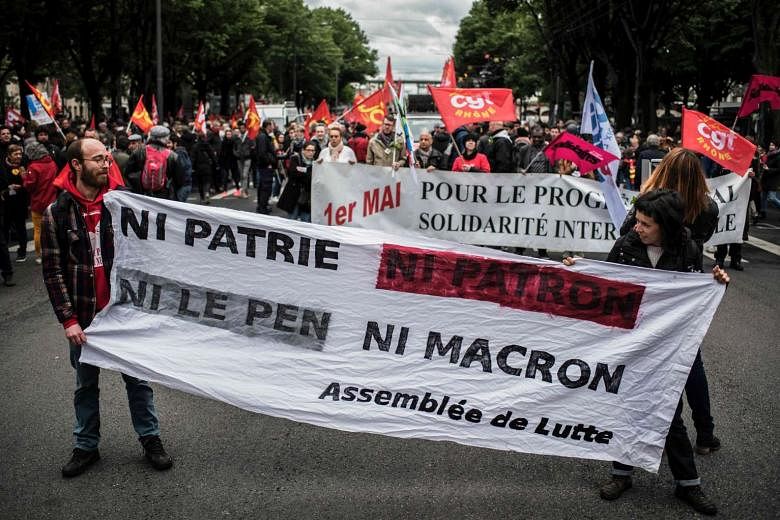STAINS (France) • For voters in the poorer, largely immigrant suburbs of Paris, the motivation to turn out for France's presidential run-off seems clear: to defeat Ms Marine Le Pen, the National Front's far-right leader who has pitched her campaign against immigrants and Muslims.
The other candidate, the centrist Emmanuel Macron, would seem to be an easy alternative. But the reality of this election cycle in towns like Stains, where public frustration is high over the failure of politicians to deliver on past promises, is that many voters may simply choose to stay home on Sunday.
"Don't count on the working- class neighbourhoods this year to save France," said Ms Ines Seddiki, a 26-year-old French-Muslim in Stains, whose parents came from Morocco. Although Ms Seddiki said she would vote reluctantly for Mr Macron, she feared she was an exception: "White people who say 'You have to vote against Marine Le Pen because you will lose more than we will' don't realise that for us, we already live in a racist country."
In the first round of the presidential election, on April 23, voters in many poorer Parisian suburbs did turn out, but for the fiery candidate on the extreme left, Mr Jean-Luc Melenchon, who channelled the anger of communities neglected by the political system. And many also chose not to vote. That second option - not voting - is now a real possibility in the final round for those who previously voted for Mr Melenchon, even though they arguably have the most at stake.
Just how many voters abstain could determine whether Ms Le Pen can upend expectations and beat Mr Macron. The prevailing assumption is that a broad majority of voters - a Republican Front that includes the poorer suburbs - will come together behind Mr Macron.
But with Mr Melenchon out, many people see the race, as expressed in an old French saying, as a choice between "la peste et le cholera" (the plague and the cholera).
To many people here, the policy proposals of both candidates are unattractive: Ms Le Pen proposes a law-and-order programme that would place bi-national Muslims at higher risk of expulsion from the country if they are considered even remotely connected to those suspected of having terrorist links.
She also has inveighed against wearing a headscarf in public.
Mr Macron, a former banker, is seen as close to the moneyed elite. He is disparaged for his support for Uber, which employs many people at low wages and often under poor conditions. He worked as a minister to socialist President Francois Hollande, who promised improvements that never arrived.
Sociologists and political scientists who study France's poorer suburbs with substantial minority populations, known as banlieues, said neither candidate had given people much reason to vote for him or her.
"They are really tired of people talking about the banlieues but not doing anything," said Mr Julien Talpin, a researcher in political science at the University of Lille.
Mr Talpin noted a big change from 2012, when the poor suburbs turned out in large numbers to vote for the Socialist Party candidate, Mr Hollande; he was running against president Nicolas Sarkozy, whom many people opposed.
"They haven't really mobilised so much against Le Pen," he said, despite the xenophobic tone of her campaign. "They are somehow feeling they are experiencing that discrimination on a daily basis."
NYTIMES

